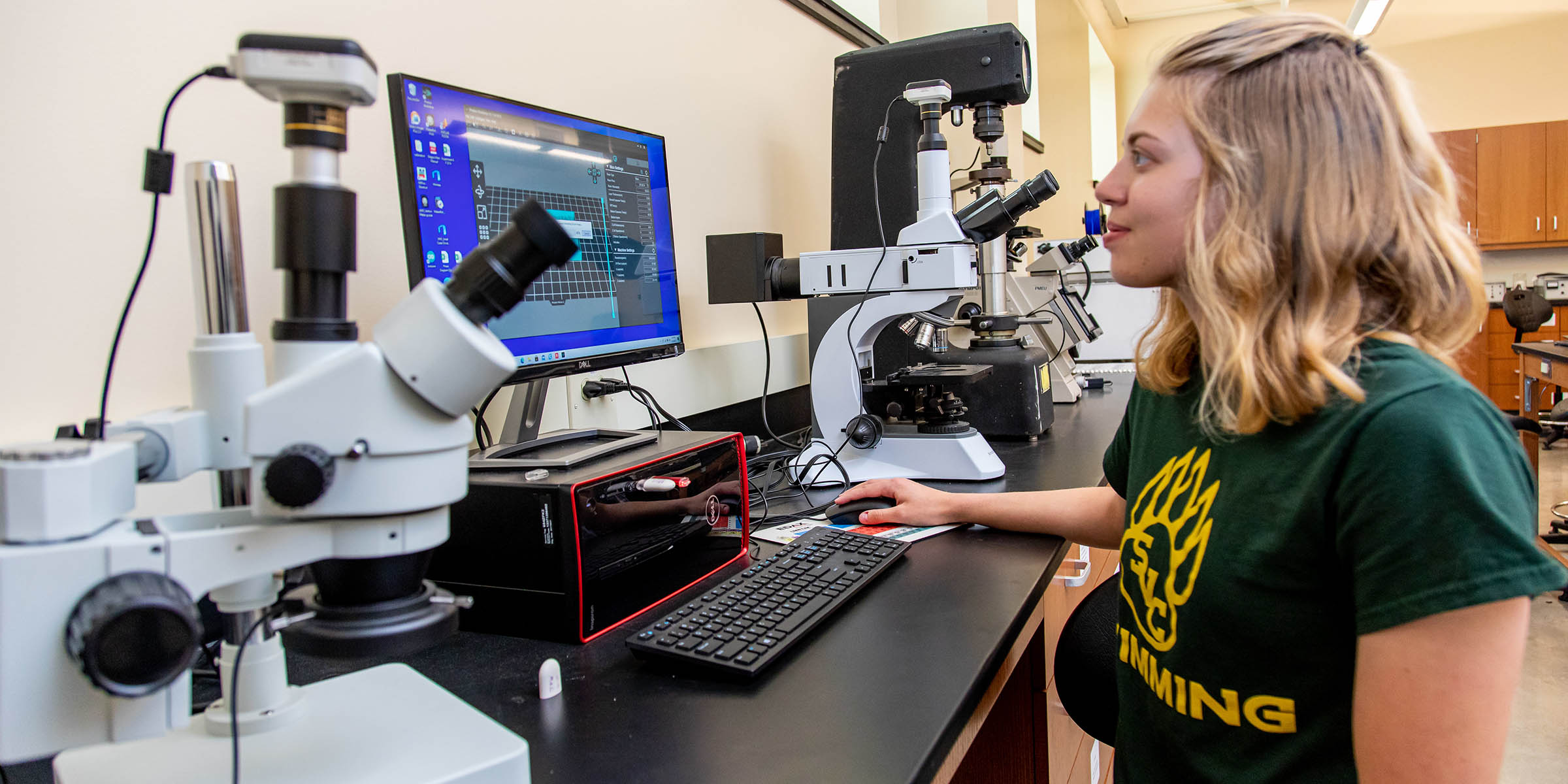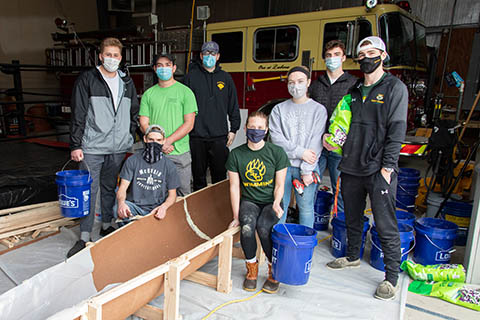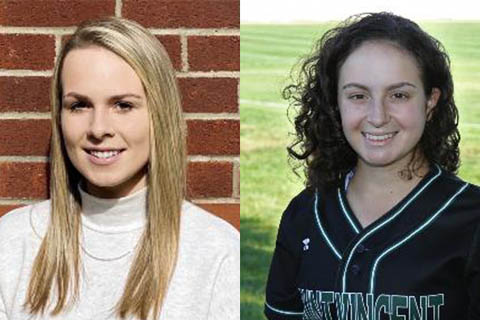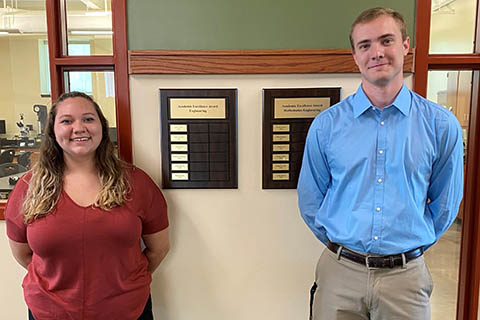Engineering
- Bachelor of Science

-
In This Section
The Engineering Program
Engineering provides a foundation in the sciences and associated mathematics that underlie engineering and provides student the opportunity to obtain a depth of knowledge in an area of their choosing through technical electives and a capstone project. The curriculum is designed for students who seek to link the engineering disciplines with science and to do so in context of a broad liberal arts education.
 Our engineering program is accredited by the Engineering Accreditation Commission of ABET, the global accreditor of college and university programs in applied and natural science, computing, engineering and engineering technology. ABET accreditation assures that programs meet standards to produce graduates ready to enter critical technical fields that are leading the way in innovation and emerging technologies and anticipating the welfare and safety needs of the public.
Our engineering program is accredited by the Engineering Accreditation Commission of ABET, the global accreditor of college and university programs in applied and natural science, computing, engineering and engineering technology. ABET accreditation assures that programs meet standards to produce graduates ready to enter critical technical fields that are leading the way in innovation and emerging technologies and anticipating the welfare and safety needs of the public.
Undergraduate Programs
Undergraduate Admission
Phone:
800-782-5549
Ext. 2500
Email:
admission@stvincent.edu
What Can I Do With a Bachelors in Engineering?
Engineering is a program in which graduates can obtain employment or use the degree as a foundation for further specialized graduate study in a specific field of Engineering. A graduate with bachelors in engineering degree could find employment as a field engineer, manufacturing process engineer, quality engineer, customer support engineer, test engineer or product development engineer.
During their four years at Saint Vincent College some students may develop a strong interest in a specific engineering discipline and choose to pursue graduate study in this field. The specialized course offerings related to environmental science, materials engineering and computer science may motivate students to pursue one of these offerings.
The bachelors in engineering degree is also a good foundation for a student who wishes to enter the field of intellectual property, either as a lawyer or as a supporting staff member for a legal team.
Curriculum Requirements
-
Requirements for a Bachelor of Science Degree in Engineering
Major Requirements (82 credits)
The student must complete the requirements listed in the following categories:Engineering Core Requirements: 33 credits
ENGR 100 Introduction to Engineering - 2 credits
ENGR 115 Introduction to Engineering Computation - 3 credits
or
CS 110 C++ Programming I - 3 credits
ENGR 220 Engineering and Computing Ethics - 2 credits
ENGR 223 Statics - 3 credits
ENGR 226 Materials Engineering - 3 credits
ENGR 228 Materials Engineering Lab - 1 credit
ENGR 240 Engineering Design and Lab - 4 credits
ENGR 261 Introduction to Electrical Circuits - 3 credits
ENGR 263 Intro Electrical Circuits Lab - 1 credit
ENGR 310 Engineering Thermodynamics - 3 credits
ENGR 315 Junior Engineering Lab – 1 creditENGR 366 Control Theory - 3 credits
ENGR 440/1 Capstone Design Project - 4 creditsEngineering Concentration Requirements: 15 credits
The student must complete one of four engineering concentrations:Chemical Engineering Concentration
ENGR 230 Chemical Engineering Fundamentals – 3 credits
ENGR 330 Fluid Mechanics – 3 credits
ENGR 340 Heat and Mass Transport - 3 credits
ENGR 360 Separation Processes – 3 credits
ENGR 420 Chemical Reaction Engineering – 3 credits
Environmental Engineering Concentration
ENGR 235 Introduction to Environmental Engineering – 3 credits
ENGR 330 Fluid Mechanics – 3 credits
ENGR 350 Alternative Energy Processes – 3 credits
ES 220 Introduction to Geographic Information Systems - 3 credits
Engineering Elective* – 3 credits
Materials Engineering Concentration
ENGR 320 Mechanics of Materials - 3 credits
ENGR 325 Advanced Strength of Materials - 3 credits
ENGR 327 Soft Materials - 3 credits
ENGR 328 High Temperature Materials - 3 credits
ENGR 340 Heat and Mass Transport - 3 creditsMechanical Engineering Concentration
ENGR 222 Engineering Graphics and Design - 3 credits
ENGR 224 Dynamics - 3 credits
ENGR320 Mechanics of Materials - 3 creditsENGR 330 Fluid Mechanics – 3 credits
ENGR 340 Heat and Mass Transport - 3 credits*Any ENGR course not required by the concentration
Technical Elective: 3 credits
The student must select one of the following:
Any 100-level or 200-level Biology course
CH 102 General Chemistry II
Any 200-level Chemistry course
Any 100-level, 200-level, or 300-level Computer Science course, excluding CS 102, CS 110, CS 357, and CS 358
Any Engineering course not required in the Engineering Core or in the student’s selected concentration
Any 100-level or 200-level Environmental Science course
Any 200-level Integrated Science source
Any 200-level, 300-level, or 400-level mathematics course, excluding those required in the Engineering core
Any 200-level or 300-level Physics course, excluding PH 214, PH 215, PH 223, PH 224, PH 225, and PH 381
Mathematics and Science Requirements: 31 credits
CH 101 General Chemistry I - 3 credits
CH 103 General Chemistry I Laboratory - 1 credit
MA 111 Calculus I - 4 credits
MA 112 Calculus II - 4 credits
MA 211 Calculus III - 4 credits
MA 212 Differential Equations - 4 credits
MA 311 Probability and Statistics - 3 credits
PH 111 General Physics I - 3 credits
PH 113 General Physics I Laboratory - 1 credit
PH 112 General Physics II - 3 credits
PH 114 General Physics II Laboratory - 1 credit -
Internships and Careers in Engineering
Students pursuing a degree in engineering are encouraged to pursue engineering internships in a field related to their area of interest, such as industrial engineer, customer service engineer, health and safety engineer, product engineer or manufacturing engineer. Students may also pursue graduate programs in a specific engineering discipline at the master’s or doctoral level, or transfer to another vocation such as business or law where engineering training offers a valuable foundation, such as intellectual property law.
Program Highlights
-
Engineering Program Educational Objectives
The objectives of the Engineering program are to produce graduates who, within a few years after graduation, will be able to:
- Pursue a career or graduate studies in engineering or a related field that benefits from their leadership and problem-solving mindset.
- Conduct themselves in a professional, ethical, and collaborative manner with respect for and awareness of social and cultural responsibilities, stewardship, and community.
- Pursue a lifestyle of service and active involvement with professional, civic, or religious organizations grounded in the pursuit of Truth that contributes to the greater benefit of society
-
Engineering Program Mission Statement
Following the Catholic and Benedictine liberal arts tradition of Saint Vincent College, the aims of the Engineering programs are:
- To instill in our graduates the values of stewardship, community, and ethical responsibility.
- To cultivate a versatile engineering curriculum, rooted firmly in fundamentals, producing well-rounded, creative graduates equipped with the knowledge and skills to meet modern challenges in engineering and related fields.
- To provide opportunities for students to engage in meaningful research in the pursuit of Truth and to practice the human-centered design of engineering solutions.
-
Student Outcomes
The Engineering curriculum is designed so that students can attain the following outcomes at the time of graduation:
- an ability to identify, formulate, and solve complex engineering problems by applying principles of engineering, science, and mathematics
- an ability to apply engineering design to produce solutions that meet specified needs with consideration of public health, safety, and welfare, as well as global, cultural, social, environmental, and economic factors
- an ability to communicate effectively with a range of audiences
- an ability to recognize ethical and professional responsibilities in engineering situations and make informed judgments, which must consider the impact of engineering solutions in global, economic, environmental, and societal contexts
- an ability to function effectively on a team whose members together provide leadership, create a collaborative and inclusive environment, establish goals, plan tasks, and meet objectives
- an ability to develop and conduct appropriate experimentation, analyze and interpret data, and use engineering judgment to draw conclusions
- an ability to acquire and apply new knowledge as needed, using appropriate learning strategies.
-
Enrollment and Graduation Data
AcademicYearEnrollment inEngineering Program*B.S. in EngineeringGraduates2019-20 7 1 2020-21 33 10 2021-22 43 10 2022-23 49 *The B.S. in Engineering Program was introduced in 2019
AcademicYearEnrollment inEngineering Science Program**B.S. in EngineeringScience Graduates2013-14 4 0 2014-15 30 3 2015-16 38 2 2016-17 42 8 2017-18 50 6 2018-19 57 18 2019-20 37 8 2020-21 8 3 2021-22 2 2 2022-23 1 **The B.S. in Engineering Science program is being phased out. This program was not available to newly admitted students as of Fall 2019.
AcademicYearEnrollment inMath/Engineering ProgramB.A. in Math/EngineeringGraduates2013-14 35 11 2014-15 34 12 2015-16 35 1 2016-17 34 12 2017-18 31 5 2018-19 32 6 2019-20 24 6 2020-21 25 6 2021-22 21 3 2022-23 16
Unique Features of the Engineering Degree
Design-Focused Engineering Curriculum
Hands-on design is emphasized throughout all four years of the Engineering Curriculum. The Engineering core curriculum provides breadth in Engineering fundamentals while the curricula for the Engineering concentrations provides depth in one of the following Engineering fields:
- Chemical Engineering
- Environmental Engineering
- Materials Engineering
- Mechanical Engineering
Start-of-the-Art Facilities
The Engineering program is housed in the new James F. Will Engineering and Biomedical Sciences Hall, which includes a multimedia classroom, an Engineering laboratory, and an Engineering CAD laboratory. Engineering students also have access to a machine shop for use in their project and capstone design classes.
Successful Preparation for Industry and Graduate School
Graduates from the Engineering program have successfully secured employment in industry or admission to top graduate programs. Recent graduates have been employed by companies including the following:
- CGI
- Kennametal
- Schlumberger
- Westinghouse
- Bettis Laboratories
- Philips Respironics
- MIT
- Penn State University
- Columbia University
- University of Pittsburgh
- Carnegie Mellon University
Engineered Musically
SVC Student Nick Pietrusinski, a double major in engineering and music with a minor in mathematics, embraces the opportunity to blend the arts and sciences at Saint Vincent College. Merging his interests in these distinct programs has Nick on a path to success while pursuing his passions.
Featured Engineering Student Work
-

Concrete Canoe Team
Under the guidance of Dr. Derek Breid, assistant professor of engineering, six seniors embarked on a year-long capstone project of building a functioning concrete canoe with the aim of sailing it on Saint Vincent Lake upon its completion. Breid explained that the project is the product of the Engineering Department’s revamped curriculum, which includes an emphasis on a larger scope, group-based design projects for each students’ required capstone. Read More »
-

Scholars Recognized
Two Saint Vincent College students have been named Clare Boothe Luce Scholars in conjunction with a program sponsored by the Clare Boothe Luce (CBL) Program for Women in STEM of the Henry Luce Foundation, which is designed to increase the amount of women who will enroll and graduate as leaders in computing, engineering and physics. Read More »

Academic Excellence
Every year, students in each academic program at SVC are recognized for their outstanding work in the classroom. Congratulations to the 2021 Academic Excellence Award Winners in Engineering - Hannah Rudy (Engineering/Materials Engineering Concentration) and Caleb Bouch (Mathematics/Engineering).
Undergraduate Programs
Undergraduate Admission
Phone:
800-782-5549
Ext. 2500
Email:
admission@stvincent.edu
